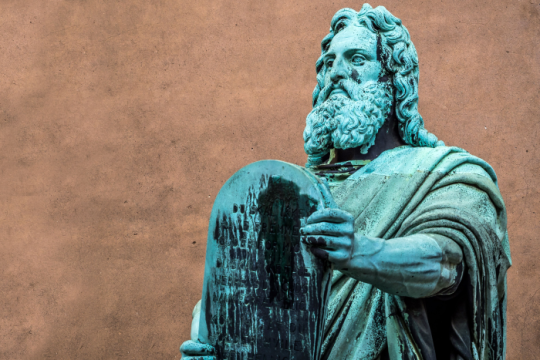
One of the most distinctive dimensions of the High Holy Days in our tradition is that among the major observances of the Jewish calendar, Rosh Hashanah and Yom Kippur are experienced primarily in the synagogue. Whereas most of our festivals are celebrated mainly in the home, with family gatherings and ritual ceremonies, these "Days of Awe" are shared in the temple, as a congregation, through the worship service. Consequently, for most of us, the prayer book takes on the central role in our impressions and perceptions of this most sacred season of the year.
The development of the liturgy of the New Year and Day of Atonement over the centuries has reflected this singular importance. Mindful of the reality that these particular services were a highlight of most people's religious lives – and for many in the modern world, their primary encounter with formal worship – the High Holiday prayer book has emerged as a virtual "intensive course in basic Judaism." All of our faith's major spiritual ideals and ethical teachings are reflected in this rich tapestry of prose and verse. Many of the most important texts of the Bible and later Jewish literature are highlighted in these prayers and readings.
The effect of the full cycle of services for these two sacred days, both evening and morning, can be a powerful experience for the sensitive, attentive worshipper. For the knowledgeable, committed Jew, Rosh HaShanah and Yom Kippur can be an inspiring reaffirmation of personal faith and a continuing cycle of Jewish celebration. And yet, even for those whose faith is less defined, or whose connection might be somewhat ambivalent, these observances can be deeply meaningful. The complex levels of emotional stirrings, the intellectual challenge, and the aesthetic interplay of language and music, all have the potential to be a compelling and renewing encounter with our tradition. The cadence of familiar words and phrases and the strains of ancient and well-loved melodies combine with the communal experience to touch so many people – with varying degrees and styles of personal spirituality – in significant ways.
For Reform Judaism, this counterpoint of emotion and intellect, so inherent in our experience of the High Holidays, is a primary focus. Whereas this season might otherwise be perceived as a time of nostalgic memories and vaguely felt cultural ties, our Reform prayer book squarely confronts us with the deeper meanings and life-transforming challenges that these observances are meant to embody. Throughout the course of the development of the Union Prayer Book over the past century, including the current versions of Gates of Repentance, the timeless themes of teshuvah (renewal and return) have been expressed in contemporary readings that reflect these ancient concepts in fresh new ways. Characteristically, our liberal Jewish liturgy echoes an essential spiritual humanism. Our interpretations of the traditional texts focus on the distinctive Jewish ideal of the Covenant – our partnership with God in the ongoing process of creation. Our worship calls us not only to offer heartfelt repentance to God, but also to seek active renewal and reconciliation in our own lives and relationships. Teshuvah means not only penitence and the petition for Divine forgiveness; it also embraces a commitment to return to the best within ourselves and in our relationships with others. These themes are especially highlighted in the particular Torah readings that our Reform forebears selected for these days – the Akeidah story of Abraham and Isaac; Deuteronomy's call to "choose life;" and Leviticus 19's Holiness Code that mandates our commitment to help the poor and powerless. These texts powerfully proclaim the spiritual and ethical challenges of Covenant and commitment, recalling our ancestors' journey to faith, and the teaching that the essence of our spiritual lives must be the pursuit of justice and compassion in our world.
As the sun sets on Yom Kippur afternoon, and the shofar is sounded for the last time, all of the inspiring words and majestic music inevitably will fade into memory. And yet they will have enduring meaning if each of us strives to integrate their eloquently proclaimed ideals and values into our daily lives, as the Kol Nidre liturgy declares, "from this Day of Atonement until the coming Day of Atonement."


